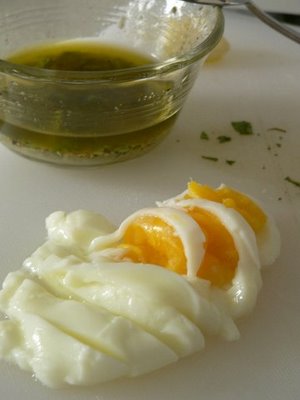158-degree eggs for lunch
Over the last several months I've seen several articles talking about "65 degree eggs" (that's Celsius). One of Hervé This's contributions to modern cooking is his rigorous study of how to boil eggs without overcooking them. There are a couple of standard rules of thumb for hard-boiled eggs, like boil them for 10 minutes, or put them in boiling water, turn of the heat, and letting them sit for 13 minutes. However, as This has meticulously documented, either of these techniques tends to overcook the eggs, giving rubbery whites and dry or even greenish yolks. The reason why is quite scientific, and has to do with the temperatures at which various proteins in the eggs coagulate. Discover magazine gives this summary:
Ovotransferrin, the first of the egg-white proteins to uncoil, begins to set at around 61 degrees Celsius, or 142°F. Ovalbumin, the most abundant egg-white protein, coagulates at 184°F. Yolk proteins generally fall in between, with most starting to solidify when they approach 158°F. Thus, cooking an egg at 158°F or so should achieve both a firmed-up yolk and still-tender whites, since at that low temperature only some of the egg-white proteins will have coagulated.
Now, the way This cooks his eggs is with a shockingly expensive digitally controlled oven set to precise temperatures. Yeah, he bakes his eggs, which takes, like, an hour or so. When fellow tech-chef Wylie Dufresne made his appearance on Iron Chef America, he did some sous vide cooking in a convection water bath, also a shockingly expensive piece of gadgetry.
I had an egg I wanted to try this with the other day, an egg I wanted to serve with some CSA lettuce and some basil parmesan dressing. I don't got the time or the money to do it as precisely as the pros, but I do have a digital instant-read thermometer and a little saucepan, and that was enough to get me a budget 65-degree egg.
 I boiled a pan of water, then turned off the heat and let the water cool to about 175 degrees. I then dropped in the room-temperature egg (crack! should carefully lowered it in! drat!), covered the pan, and watched the time and temperature. The couple of times the temperature went below about 160 degrees, I turned the heat on to low and let the water get back up to 170 or so. After about 20 minutes of this, I removed the egg, rinsed it in cold water for a few minutes, then removed the shell.
I boiled a pan of water, then turned off the heat and let the water cool to about 175 degrees. I then dropped in the room-temperature egg (crack! should carefully lowered it in! drat!), covered the pan, and watched the time and temperature. The couple of times the temperature went below about 160 degrees, I turned the heat on to low and let the water get back up to 170 or so. After about 20 minutes of this, I removed the egg, rinsed it in cold water for a few minutes, then removed the shell.The results were quite intruiging. The yolks were a little like a soft-boiled egg, soft and smooth, with none of the dry graininess of a hard-boiled egg, but definitely set and not runny at all. The whites were unbelievably soft as well. The whole experience of these eggs was remarkable, much better than I had anticipated.
Next time I do this, I'll do a couple things different. First, I won't crack the egg when I drop it in the pot. As you can see from the photo, the egg didn't really hold together that well, and that was a big reason why not. Second, I'll use an egg slicer to cut the egg. A wire instead of a knife will hopefully allow the egg to remain in slices instead of just getting squished. And third, I'll try to get some really fresh pastured eggs from the greenmarket, so see if the reported advantages of those eggs makes the results even that much better.
I'm pretty sure the temperature of the water and the time worked well, though. Room temperature egg, 20 minutes, 160-175 degree water. When mixed with lettuce, and topped with olive oil, white wine vinegar, minced basil, grated parmesan, salt and pepper, it made quite a tasty lunch.







2 Comments:
That is a beautifully cooked egg, Harlan. I did not think it was possible, but it turns out I am not nearly obsessive-compulsive enough. I will certainly have to try this. Those eggs would just love a shtshav-bath.
ps. here via Haverchuk.
Harlan,
Very nice egg, indeed.
I know this is random, but I've got a very dull summer job right now, so I've been periodically googling coop ppl to see what everyone's up to...
I had to comment on the eggs... It's silly, but those little red-and-clear-plastic egg timers (~$5 at kitchen stores) - you put them in the pot of boiling water when you put the eggs in - yield similar and perfect results. They're also good enough to tell you how done you're getting the egg - soft to completely firm in the center - so you've got some control over the end product.
Julie
Post a Comment
Subscribe to Post Comments [Atom]
<< Home